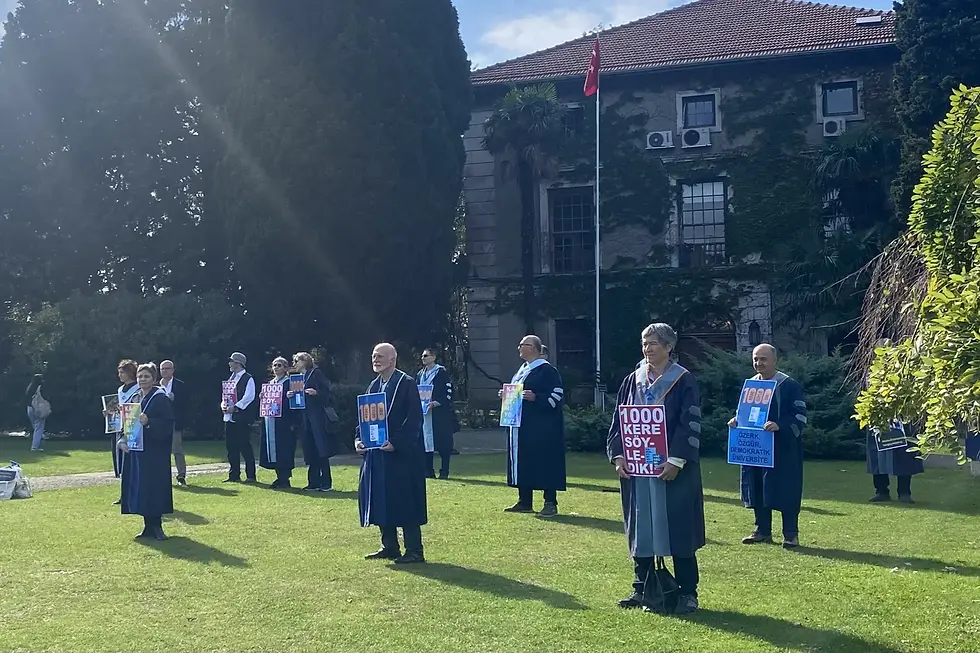New Law Reaffirms Presidential Control over Turkish Higher Education
- Endangered Scholars Worldwide
- Aug 20, 2025
- 3 min read

In recent years, the decline of academic freedom has paralleled autocratization in Turkey. Turkish universities have been under strict state control through the country’s Council of Higher Education (CHE) for multiple decades. However, since 2018, the situation has worsened as state power has become consolidated in the office of the President of the Republic in an increasingly personalized regime under Recep Tayyip Erdoğan.
It was in this context that a June 2024 ruling by the Constitutional Court of the Turkish Republic was cautiously welcomed by critics of the government. In their ruling, the court had annulled parts of a presidential decree from 2018 that placed the appointment of university rectors under direct presidential control as being in violation of articles of the Turkish constitution on university autonomy. The presidential decree was issued during a state of emergency declared in the aftermath of a failed coup attempt in 2016.
However, a recent development disappointed expectations about a relative opening in academic freedom through the relaxation of presidential control. An omnibus law passed in the Turkish Grand National Assembly on June 18, 2025, formally reestablished direct presidential control over universities in Turkey by maintaining verbatim the wording of the annulled presidential decree giving the president the sole authority to appoint rectors. Under the new law, the president will appoint rectors to public and private universities. In the case of private universities, the law gives their Board of Trustees the authority to propose a candidate for rectorship. For public universities, the law foresees no input at all from any university community members.
The constitutional court had given the assembly a year to pass new legislation regulating rector appointments in line with the constitution. However, in the year following the constitutional court’s ruling, Recep Tayyip Erdoğan, appointed 63 rectors, in violation of the ruling of the constitutional court. Many of the appointees have close ties to Erdoğan’s Justice and Development Party, with some of them being former representatives or candidates from his party.
In Turkey, the president’s control over higher education is not limited to the appointment of rectors, however. The president’s office manages and directs many aspects of higher education through the CHE, which in turn has strict control over university affairs. The CHE consists of twenty-one members, seven of whom are appointed by the president directly. Another seven are appointed by the Council of Ministers, whom are themselves also chosen solely by the president. The remaining seven are recommended by a council of professors from each university. But the president does not have to appoint those selected by this council. If no appointments are made in a set time period, the selection of remaining members is left to the president.
Erdoğan has frequently used the authority given to him by law to unilaterally shape higher education, without any input from universities themselves. For example, recently, a presidential decree created thirteen new faculties and institutes, closed nine, and renamed a handful more overnight, in violation of the institutional autonomy of universities, which is a principle enshrined in the constitution.
One of the institutions impacted by this degree is Boğaziçi University, which became a locus of protests against governmental violations of academic freedom in 2021 after the appointment of a government-loyalist trustee rector. More than four years later, Boğaziçi University academics are still continuing their regular vigil in front of the rector’s building in protest, frequently voicing their protest against the authoritarian use of presidential powers to shape higher education in Turkey and criticizing the new law regulating the appointment of rectors, calling it an example of “an arbitrary and top-down understanding of governance”.
Academic organizations outside of Turkey have also criticized the new law on rector appointments. The Middle East Studies Association, in a letter addressed to the Turkish government, wrote that the law “undermines both judicial authority and academic autonomy, raising serious concerns regarding the future legal prospects of academic freedom”. The European University Association called the restoration of the sole authority to appoint rectors to the president “a lost opportunity to provide greater autonomy to Turkish higher education institutions”.
Endangered Scholars Worldwide (ESW) is concerned with the continued repression of academic freedom and the authoritarian use of presidential powers to unilaterally shape higher education in Turkey. We condemn the restoration of the power to appoint rectors to the president, in violation of the ruling of the Constitutional Court of the Turkish Republic. We join the international community’s call for the implementation of reforms in Turkey that will allow for the exercise of academic freedom and institutional autonomy for universities.




